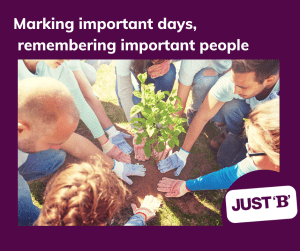Anniversaries and key dates in the diary can be an especially difficult or isolating time for people experiencing bereavement, whether their significant person died recently or many years ago.
In time for Mother’s Day, our Just ‘B’ team shares some useful ideas on how people can look after themselves if they are experiencing grief for a mum, step mum grandma, or important female role model in their life, and suggestions for families to mark the day.

Sometimes we might wish to find different ways to mark the day:
- Visit mum’s favourite place or somewhere special to her
- Read a book or poem that connects you with her
- Have some quiet time to reflect
- Hold, wear or carry something in your pocket that connects you to mum – an item of clothing, a watch or piece of jewellery.
- Write her a letter or a poem or a song. Maybe you could start with something like ‘If you came back for just 5 minutes, I’d tell you….’
Sometimes it’s helpful to do something together as a family:
Children and young people may experience and express grief and bereavement in different ways and that they may not grieve in the same way that we might expect. They can still play and be happy even if others around them are upset.
There is no ‘right way’ to express grief, and children may wish to do nothing – or any of the following ideas.
Try and have a conversation ahead of the day with a simple statement such as: “I am aware it is nearly mother’s day, would you like to mark this day in any way?”
- Take a special card to her grave – or to where her ashes were buried or scattered
- Blow some bubbles and send her your love on the wind
- Plant some bulbs, seeds or a shrub in a place that holds special memories
- Cook her favourite meal or a meal with family memories – or enjoy a favourite takeout
- Make a memory box in which to keep things that remind you of her – photos, shells, holiday snaps, glasses, a necklace etc. Or create a scrapbook with similar things – dried flowers, cards, written memories
- Make or buy a new frame for your favourite photograph of her – think about the image – what was she doing?
- Talk about your mum with your family, what memories does everyone have of her?
- Above all, be kind to yourself and do what feels right for you
It’s also OK to do nothing to mark the day
- For some people, treating the day as any other day is best for them, rather than making it significant. Be kind to yourself and do what is right for you and your family.
Sometimes our relationship and memories of the person who has died may be harder or more complicated.
- Embracing the memories of the person who has died can be comforting and painful; talk about them and give yourself permission to cry as and when you need to.
- Try to let others know how you are feeling and how you would like to be comforted – whether that means giving you space to be alone, or being there to listen and give you a hug.
- Make time for yourself. Doing something for yourself that you enjoy, no matter how small, can be a great psychological break.
- Above all, remember it’s OK not to feel OK. Do what feels right for you.
Please remember, if you’d like to talk, we’re here to listen. If you need support with grief, bereavement, or emotional wellbeing, we are here for you if you need us:
– Hear to Help helpline across North Yorkshire seven days a week, 8am-8pm: (01423) 856 799.
– Bereavement and emotional wellbeing support from our Just ‘B’ services for children, young people and adults – www.justb.org.uk.
